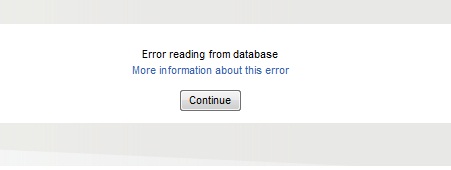Error reading from Data base

Hi friends,
I was running Moodle 2.3.1 (using Build: 20120726).
While I was attempting to restore a course backup I was greeted with the following error

I proceeded to click on the "More information" link, and was faced with the following message:

Purge all caches
MoodIe can cache themes, JavaScript, language strings, filtered text, RSS feeds and many other pieces of calculated data.
Purging these caches will delete that data from the server and force browsers to refetch data, so that you can be sure you are
seeing the most up-to-date values produced by the current code. There is no danger in purging caches, but your site may
appear slower for a while until the server and clients calculate new information and cache it.
Purge all caches Cancel
I Chose to purge all the caches, but the problem still persisted.
I have successfully restored other backup files in the past using the current install of Moodle.
The problematic backup file has also previously been used successfully a number of times.
I found that this same error also shows up when I select Site Registration/Administration:
Does anyone have a clue about this error and how to deal with it?












